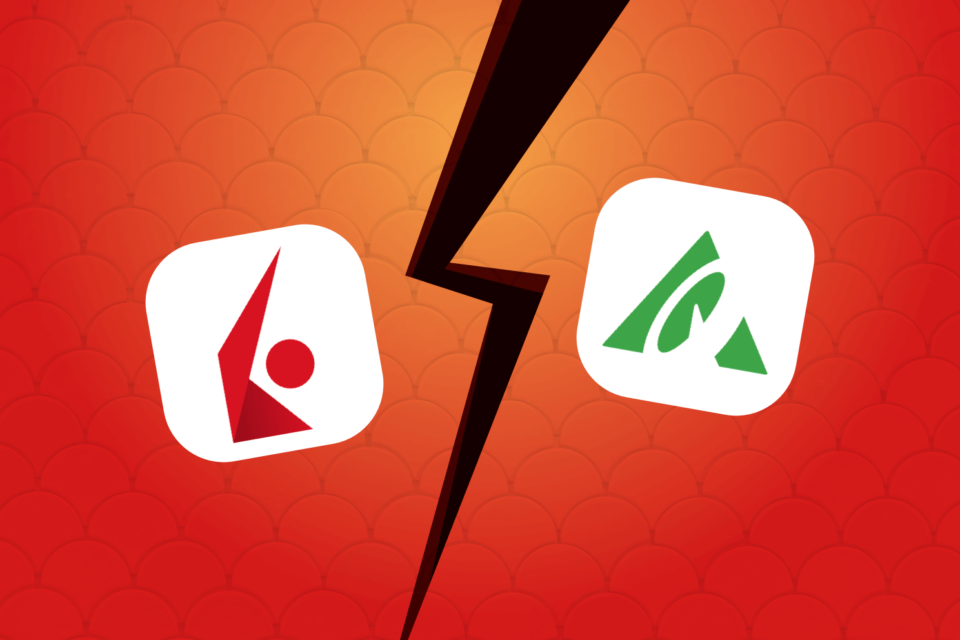Interactive Brokers vs Questrade: The Ultimate Comparison Guide

Interactive Brokers vs Questrade… A much-needed comparison for the Canadians who are wise enough to do their due diligence before they open a brokerage account.
While both of those companies are considered “discount brokers”, there are some very important differences that you should take into account before you go with either. After all, the financial needs and investment goals are simply not the same for all.
Our aim is to help you gather all the relevant information about both brokers and make an informed decision.
We hope that after you go through our Interactive Brokers vs Questrade comparison, we will have achieved our goal and you will have chosen the right broker for your needs.
Let’s get started with a head-to-head comparison table…
Interactive Brokers vs Questrade: A Head-to-Head Comparison

| Interactive Brokers | Questrade | |
| Ideal for | Those who appreciate the more sophisticated research tools for investors and who are looking to pay as little as possible while trading options | Those who are (also) interested in indexing and are looking for a wide variety of ETFs at no purchasing cost |
| Account Types |
|
|
| Cost |
|
|
| Asset Types |
|
|
| Minimum Balance | $100 | $1,000 |
Interactive Brokers vs Questrade: At a Glance
Interactive Brokers was founded in New York City 44 years ago (1978) and it has $363 billion assets under management. Questrade was founded 23 years ago (1999) and it has $25 billion under management as of January 2022.
It’s natural for Interactive Brokers to have way more assets under management as it’s an older and more established broker with more international appeal. Having said that, Questrade is one of the fastest-growing Canadian brokers when it comes to the money they got to manage.
Interactive Brokers is strictly an online brokerage firm, while Questrade tries to be something more now. In December 2019 the company applied for a banking license so they may start offering banking services too.
When it comes to cost, both brokers are cheap in their own way. Interactive Brokers is cheap for trading stocks and options frequently, while Questrade is ideal for ETF dollar-cost averaging due to the zero fees on purchasing them.
Interactive Brokers has both a tiered and fixed fee structure to choose from depending on the trading frequency and fund size. Questrade has a more simple fee structure.
While Interactive Brokers has almost all of the usual account types that you may need, if you’re based in Canada, Questrade offers account types such as the Locked-In Retirement Account (LIRA) that Interactive Brokers doesn’t.
Both have Robo-advisors to use if you’re into passive investing.
All in all, go with Interactive Brokers if you’ve got some experience with trading already and you are looking to trade various assets from stocks to options at a low cost.
If you are based in Canada and you are looking to buy ETFs for free or you are likely to need Canada-based retirement accounts, Questrade is for you.
Interactive Brokers vs Questrade: Account Types
Interactive Brokers and Questrade’s Common Account Types
- Individual Account
A self-directed brokerage account
- Tax-Free Savings Account (TFSA)
An investment account that you can use to invest and not get taxed on your gains
- Registered Retirement Savings Plan (RRSP)
A retirement account that you can invest through and reduce your taxes by subtracting your contributions from your income
- Small Business / Corporate Account
Αn account in your company’s name where your business’ funds will be taxed according to the corporate tax rates
- Individual Margin Account
A brokerage account that allows you to use leverage to invest by borrowing money against the investments in your account
- Trust Account
An account (legal entity) in which the assets are held by one person or corporation for the benefit of another
Interactive Brokers (Account Types that Questrade Doesn’t Offer)
- Friends and Family Account
A master account that allows you to execute orders for family members and friends who have opened accounts with Interactive Brokers
- Family Office Account
A master account that is linked to multiple client accounts
- Advisor Account
An account for registered financial advisors
- Money Manager Account
An account for registered financial money managers
- Hedge or Mutual Fund Account
An account with one or more owners with the ability to maintain multiple sub-accounts for different strategies
- Proprietary Trading Group Account
An account for a corporation, partnership, limited liability company, or unincorporated legal structure to hold assets owned by the entity account holder.
- Broker & FCM Accounts
A master account that is linked to an individual or organization client accounts and is used for fee collection
- Compliance Officers Account
An account that is linked to multiple individual, joint, trust, or IRA employee accounts for monitoring their trading activity
- Administrators Account
An account that is linked to multiple Advisor, Single or Multiple Hedge Fund, and Proprietary Trading Group accounts for providing various administrative functions to one or more client, fund, or sub-accounts
Questrade (Account Types that Interactive Brokers Doesn’t Offer)
- Registered Education Savings Plan (RESP)
An account that is specifically for putting money aside for a child’s education
- Locked-in retirement account (LIRA)
A retirement account that doesn’t permit withdrawals before retirement except in exceptional circumstances and holds a pension for a former plan member, an ex-spouse, or a surviving spouse - First Home Savings Account (FHSA)
A registered savings account for first time home buyers for putting money aside for a first home tax-free
- Registered Retirement Income Fund (RRIF) Account
An account for a retirement fund that is similar to an annuity contract paying out income to one or more beneficiaries
- Life Income Fund (LIF)
An account similar to an RRIF, that is offered in Canada and can be used to hold locked-in pension funds and other assets for a future retirement income
- Investment Club Account
An account for trading along with others (up to 10 members)
Interactive Brokers vs Questrade: Offerings and Fees
Interactive Brokers and Questrade’s Common Offerings
Stocks/ETFs
Interactive Brokers: CAD 0.01 per share (minimum per order: CAD 1.00)
Questrade: Stock trading costs $4.95 to $9.95 per transaction + $0.01 per share and ETFs are free to buy but cost $4.95 to $9.95 per transaction + $0.01 per share to sell
Options
Interactive Brokers: Depending on the trading volume per month, you can expect to be paying CAD 1.00 to 1.25 per contract
Questrade: $9.95 per transaction + $1 per contract
Bonds
Interactive Brokers:
For corporate bonds, they charge 10 basis points × Face Value + USD 1.00 per order for the first USD 10,000 in Face Value and 2.5 basis points × Face Value for the additional face value beyond USD 10,000.
For municipal bonds, they charge 5 basis points × face value + USD 1.00 per order for the first USD 10,000 in face value and 1.25 basis points × face value for the additional face value beyond USD 10,000.
Questrade: Bonds are free to buy if the face value is at least $5,000
Metals
Interactive Brokers:
For London gold and US Spot gold, they charge:
- 1.5 basis points × trade value + USD 2.00 for up to a USD 500,000 order amount,
- 1.0 basis point × trade value for a USD 500,000.01 – 1,000,000 order amount, and
- 0.7 basis point × trade value for an order amount larger than USD 1,000,000.
For London silver, they charge:
- 3.0 basis points × trade value + USD 2.00 for up to a USD 250,000 order amount,
- 2.0 basis point × trade value for a USD 250,000.01 – 500,000 order amount, and
- 1.5 basis point × trade value for an order amount larger than USD 500,000.
Questrade: $19.95 USD per trade
Mutual Funds
Since Interactive Brokers offers access to different mutual funds and the cost depends on what exchange you want to buy from, a comparison with Questrade isn’t possible.
Questrade charges $9.95 per transaction, regardless of what mutual fund you are looking to buy.
Take a look at both the related IB page to see what you will have to pay for the mutual fund you are looking to trade
International Equities
Interactive Brokers:
When it comes to European equities, you will pay USD 4.00 for trades up to USD 8,000 and 0.05% of trade value for trades over USD 8,000.
For the rest of the world, it depends on what country you are looking to buy stocks in. Check this page for more information.
Questrade: 1% of the trade value with a minimum $195.00 per transaction required + applicable exchange or stamp fees
Forex
Interactive Brokers:
You will pay:
- 0.20 basis point × Trade Value + USD 2.00 for up to a USD 1,000,000,000 monthly trade amount,
- 0.15 basis point × Trade Value + USD 1.50 for a monthly volume of USD 1,000,000,000.01 – 2,000,000,000,
- 0.10 basis point × Trade Value + USD 1.25 for a monthly volume of USD 2,000,000,000.01 – 5,000,000,000, and
- 0.08 basis point × Trade Value + USD 1.00 for more than USD 5,000,000,000 monthly amount.
Questrade:
With Questrade, it depends on what currency pair you want to trade. So, take a look at the related page to find out how much you will pay to trade currencies.
CFDs
Since there are all kinds of CFDs, it’s advisable to look at each broker’s respective page to understand what the cost associated with trading such securities is:
Interactive Brokers’ CFD pricing
Interactive Brokers (Offerings that Questrade Doesn’t Have)
- Warrants (the fees that apply are the same that apply to stocks and ETFs)
- Treasury Bills (0.2 basis points × face value for the first USD 1,000,000 in face value and 0.01 basis points × face value for the additional face value beyond USD 1,000,000)
- Futures (CAD 2.40 per contract, min. CAD 2.40 per order)
- Single Stock Futures (cost varies per country)
Questrade (Offerings that Interactive Brokers Doesn’t Have)
- Guaranteed Investment Certificates (GICs) (free with a min. $5,000 purchase)
Interactive Brokers vs Questrade: Research Tools

When it comes to research tools, both Interactive Brokers and Questrade have great things to offer. When it comes to variety, however, Interactive Brokers is clearly the winner here. But you’ll find its tools too sophisticated to use if you’re not an active and experienced trader.
Interactive Brokers’ Tools:
- Stock, ETF, Options, Mutual Fund, and Fixed Income ScreenerA tool that allows you to set quantitative criteria and find stocks that fulfill them
- CalculatorsIB offers various calculators that are used to predict options prices, calculate your approximate available margin for stocks/ETFs, determine the interest that you will be charged for margin loans, etc.
- Trading Idea GeneratorA tool that generates ideas for you to find potential trading opportunities
- SRI/ESG Research AmenitiesIB provides you with tools to screen for stocks that fulfill your ethical criteria
- Third-Party ResearchWith IB, you will be able to access research from analysts that is published on other authoritative websites
Questrade’s Tools:
- Questrade Intraday TraderA screening tool to find investment opportunities based on quantitative criteria
- Questrade IPO CentreA newsletter that alerts you for any new IPOs and secondary offerings
- News, Insights & ResearchWith Questrade’s platform, you will have easy access to financial news, analyst research, and investment ideas
Interactive Brokers vs Questrade: Customer Service

Interactive Brokers’ Customer Service:
- 24/6 toll-free telephone support
- Online Live chat
- Secure message center
- AI-powered IBot that directs customers to FAQs
Questrade’s Customer Service:
- Available phone line from 8 am to 4:30 PM Eastern time
- Live chat
- Email support
Interactive Brokers vs Questrade: Safety

Regarding safety, you will have no issues with either broker as they’re both regulated and provide coverage in case of insolvency.
Cash and securities that you hold in Interactive Brokers are protected by the SIPC (Securities Investor Protection Corporation) with coverage of up to $500,000.
Questrade, now, is regulated by the Investment Industry Regulatory Organization of Canada (IIROC). In other words, if Questrade goes bankrupt, your money is insured up to $1 million per account by CIPF.
This broker also has private insurance and ensures up to $10 million per client, on top of the $1 million insurance that CIPF provides.
Conclusion: Which is the Right Broker for you?
Interactive Brokers is best suited for sophisticated investors who are looking for low fees and a great variety of asset types to invest in and research tools to use.
Questrade will be ideal for those who want to invest periodically in ETFs without incurring any fees. It’s also a great option for those who are looking to buy GICs and open account types only offered in Canada.
All in all, you can’t really go wrong with either broker here. It just depends on what you’re after as an investor.
Don’t forget that whatever broker you decide to go with, it’s a good idea to connect your brokerage account with the rest of your assets to always have the complete picture of your finances.
That’s why we created Wealthica; to help people like you who have (or are going to have) multiple accounts that their net worths are tied to.
Wealthica is a free financial data aggregator that will connect all of your accounts and give you access to what most people don’t have; a definite idea of where you are financially so you know where to go.
Sign up to Wealthica today and get control of your finances…
Interactive Brokers vs Questrade: FAQ
Is Interactive Brokers Canada good?
Interactive Brokers Canada is as good as the broker itself. That’s because there is not a significant difference between them as the former is just based on Canada. The offerings and fees are the same (except in CAD).
Is Questrade Good for Beginners?
Questrade has a user-friendly, yet sophisticated, platform that is designed for both beginners and experienced investors alike.
Does Interactive Brokers Charge for Inactivity?
No, Interactive Brokers no longer charge an inactivity fee.
Does Questrade Charge for Inactivity?
No, you will not incur any inactivity fee with a Questrade account.



